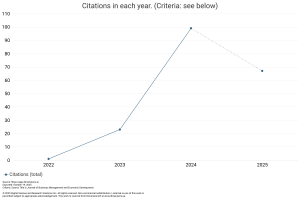Comprehensive Analysis of Business Catering Samarinda’s Business Feasibility to Assess Its Potential and Sustainability
DOI:
https://doi.org/10.59653/jbmed.v3i03.2002Keywords:
Business Feasibility, Digital Marketing, Financial Analysis, Catering, SMEsAbstract
This study aims to analyze the feasibility of a catering business in Samarinda by reviewing four main aspects, namely marketing, operations, legality, and finance. The background of this study is based on the increasing trend of culinary businesses in Indonesia that utilize digital marketing strategies as the main means of expanding their market reach. The research method uses a mixed method approach, namely qualitative and quantitative. The qualitative approach was used to analyze business strategies, operational activities, and the implementation of business legality, while the quantitative approach was applied to assess financial feasibility through the indicators of NPV, IRR, PP, and BEP. The results show that the business is feasible with a positive NPV of IDR 264,833, an IRR of 14.60%, a payback period of 2.3 years, and a BEP at 58% of production capacity. In addition to being financially feasible, this business has also fulfilled legal aspects through the establishment of the business entity and the ownership of an NIB and NPWP. This study emphasizes the importance of integrating digital marketing strategies with business feasibility analysis to create a competitive, innovative, and sustainable culinary business in the competitive digital era.
Downloads
References
Abdallah, W., Harraf, A., Ghura, H., & Abrar, M. (2024). Financial literacy and small and medium enterprises performance: the moderating role of financial access. Journal of Financial Reporting and Accounting, 23(4), 1345–1364. https://doi.org/10.1108/JFRA-06-2024-0337
Abuk, G. M., & Rumbino, Y. (2020). Analisis Kelayakan Ekonomi Menggunakan Metode Net Present Value (Npv), Metode Internal Rate Of Return (Irr) Payback Period (Pbp) Pada Unit Stone Crusher Di Cv. X Kab. Kupang Prov. Ntt Economic Feasibility Analysis Using Net Present Value (Npv) Method, Pay. Jurnal Ilmiah Teknologi FST Undana, 14(2).
Adeosun, K. P., Greene, M., & Oosterveer, P. (2022). Informal ready-to-eat food vending: a social practice perspective on urban food provisioning in Nigeria. Food Security, 14(3), 763–780. https://doi.org/10.1007/s12571-022-01257-0
Agustin, H., Almuttaqin, M. A., Yusnita, R. R., & Safitri, N. (2023). Analyzing Business Feasibility: A Comprehensive Study Using Hamdi’s Method. Journal of System and Management Sciences, 13(4), 521–534.
Anas, A. M., Abdou, A. H., Hassan, T. H., Alrefae, W. M. M., Daradkeh, F. M., El-Amin, M. A. M. M., Kegour, A. B. A., & Alboray, H. M. M. (2023). Satisfaction on the Driving Seat: Exploring the Influence of Social Media Marketing Activities on Followers’ Purchase Intention in the Restaurant Industry Context. Sustainability (Switzerland), 15(9). https://doi.org/10.3390/su15097207
Ayesha, I., Amaliyah, I. W. A. P. S. H., Yusnanto, N. I. E. T., Firdaus, N. D. M. S. D. R. D. U. A., Fitriana, M. M., & Egim, N. A. S. (2022). Digital Markting (Tinjauan Konseptual).
Bag, S., Gupta, S., Kumar, A., & Sivarajah, U. (2020). An integrated artificial intelligence framework for knowledge creation and B2B marketing rational decision making for improving firm performance. Industrial Marketing Management, 92, 178–189. https://doi.org/10.1016/j.indmarman.2020.12.001
Berawi, M. A., Putri, C. R., Sari, M., Salim, A. V., Saroji, G., & Miraj, P. (2021). An Infrastructure Financing Scheme for Industrial Development. International Journal of Technology, 12(5), 935–945. https://doi.org/10.14716/ijtech.v12i5.5202
Boyland, E., Thivel, D., Mazur, A., Ring-Dimitriou, S., Frelut, M. L., & Weghuber, D. (2020). Digital Food Marketing to Young People: A Substantial Public Health Challenge. Annals of Nutrition and Metabolism, 76(1), 6–9. https://doi.org/10.1159/000506413
BPS. (2024). Statistik Penyediaan Makanan dan Minuman 2023. Badan Pusat Statistik. https://www.bps.go.id/id/publication/2024/12/23/f2c7743c4712aaeaa4abf694/statistik-penyediaan-makanan-dan-minuman-2023.html
Campbell, S., Greenwood, M., Prior, S., Shearer, T., Walkem, K., Young, S., Bywaters, D., & Walker, K. (2020). Purposive sampling: complex or simple? Research case examples. Journal of Research in Nursing, 25(8), 652–661. https://doi.org/10.1177/1744987120927206
Cardoso, R. N. C., Blanco, C. J. C., & Duarte, J. M. (2020). Technical and financial feasibility of rainwater harvesting systems in public buildings in Amazon, Brazil. Journal of Cleaner Production, 260, 121054.
Chou, S. F., Horng, J. S., Liu, C. H., Yu, T. Y., & Kuo, Y. T. (2022). Identifying the critical factors for sustainable marketing in the catering: The influence of big data applications, marketing innovation, and technology acceptance model factors. Journal of Hospitality and Tourism Management, 51, 11–21. https://doi.org/10.1016/j.jhtm.2022.02.010
Chou, T. C., & Lu, H. P. (2022). How to observe business operations: An empirical study of family business. PLoS ONE, 17(4 April), 1–17. https://doi.org/10.1371/journal.pone.0267223
Clark, V. L. P. (2019). Meaningful integration within mixed methods studies: Identifying why, what, when, and how. Contemporary Educational Psychology, 57, 106–111.
Dogra, P., & Kaushal, A. (2023). The impact of Digital Marketing and Promotional Strategies on attitude and purchase intention towards financial products and service: A Case of emerging economy. Journal of Marketing Communications, 29(4), 403–430.
Ferisanti, Dwita, F., Supardi, & Muslawardah. (2023). Analisa Break Event Point (Bep) Terhadap Laba Perusahaan. Jurnal Pengabdian Kepada Masyarakat, 29. https://doi.org/10.15408/ess.v4i1.1955
Fuciu, M. (2022). Social Media Profiling for the Development of Online Marketing Strategies. Studies in Business and Economics, 17(3), 80–89. https://doi.org/10.2478/sbe-2022-0047
Garrido-Moreno, A., Martín-Rojas, R., & García-Morales, V. J. (2024). The key role of innovation and organizational resilience in improving business performance: A mixed-methods approach. International Journal of Information Management, 77. https://doi.org/10.1016/j.ijinfomgt.2024.102777
Hairudinor, & Rusidah, S. (2023). The role of digital marketing in the Sustainable performance of Indonesian MSMEs: Do the online purchase intention and actual purchase decision matter? Transnational Marketing Journal, 11(1), 17–30. https://doi.org/10.58262/tmj.v11i1.1002
Hien, N. N., & Nhu, T. N. H. (2022). The effect of digital marketing transformation trends on consumers’ purchase intention in B2B businesses: The moderating role of brand awareness. Cogent Business and Management, 9(1). https://doi.org/10.1080/23311975.2022.2105285
Hofacker, C., Golgeci, I., Pillai, K. G., & Gligor, D. M. (2020). Digital marketing and business-to-business relationships: a close look at the interface and a roadmap for the future. European Journal of Marketing, 54(6), 1161–1179. https://doi.org/10.1108/EJM-04-2020-0247
Jamil, K., Dunnan, L., Gul, R. F., Shehzad, M. U., Gillani, S. H. M., & Awan, F. H. (2022). Role of Social Media Marketing Activities in Influencing Customer Intentions: A Perspective of a New Emerging Era. Frontiers in Psychology, 12(January), 1–12. https://doi.org/10.3389/fpsyg.2021.808525
Kasmir, & Jakfar. (2013). Studi Kelayakan Bisnis.
Kauffmann, E., Peral, J., Gil, D., Ferrández, A., Sellers, R., & Mora, H. (2020). WITHDRAWN: A framework for big data analytics in commercial social networks: A case study on sentiment analysis and fake review detection for marketing decision-making. Industrial Marketing Management, 90(August), 523–537. https://doi.org/10.1016/j.indmarman.2019.08.003
Kotler, P., & Keller, L. K. (2012). Marketing Management, 14th Edition by Philip Kotler & G. Amstrong (p. 812).
Krisdianto, D., Gulwani, A., Rahman, A., Ahmad, A., Rafly, M., Maulana, M. F., & Setiawan, R. (2023). The feasibility study analysis of food business development. International Journal of Entrepreneur and Business Administration, 1(1), 29–41.
Malian, S. (2018). Pengantar Hukum Bisnis. 17, 433.
Olson, E. M., Olson, K. M., Czaplewski, A. J., & Key, T. M. (2021). Business strategy and the management of digital marketing. Business Horizons, 64(2), 285–293. https://doi.org/10.1016/j.bushor.2020.12.004
Rei, M. C. C., Correia, D. M. E., Torres, D. P. M., Lopes, C. M. M., Costa, A. I. A., & Rodrigues, S. S. P. (2025). Patterns of food preparation in children and adult diets and their associations with demographic and socio-economic characteristics, health and nutritional status, physical activity, and diet quality. Journal of Nutritional Science, 14(14). https://doi.org/10.1017/jns.2024.87
Schoenmaker, D., & Schramade, W. (2023). Corporate Finance for Long -Term Value. https://link-springer-com.ezproxy.rgu.ac.uk/book/10.1007/978-3-031-35009-2
Sharabati, A. A. A., Ali, A. A. A., Allahham, M. I., Hussein, A. A., Alheet, A. F., & Mohammad, A. S. (2024). The Impact of Digital Marketing on the Performance of SMEs: An Analytical Study in Light of Modern Digital Transformations. Sustainability (Switzerland), 16(19), 1–25. https://doi.org/10.3390/su16198667
Syahputra, Salean, J. F., Nurhayati, N., & Suaryasa, N. G. I. (2023). Studi Kelayakan Bisnis.
Takona, J. P. (2024). Research design: qualitative, quantitative, and mixed methods approaches. Quality & Quantity, 58(1), 1011–1013.
Traynor, M., Owens, E., O’Neill, S., & Rahman, I. (2024). Restaurant resilience: A qualitative study of resilience, adaptability, and innovation of the Alabama restaurant industry during the COVID-19 pandemic. Journal of Innovation and Knowledge, 9(4), 100583. https://doi.org/10.1016/j.jik.2024.100583
Wang, S., Li, Y., & Khaskheli, M. B. (2024). Innovation Helps with Sustainable Business, Law, and Digital Technologies: Economic Development and Dispute Resolution. Sustainability (Switzerland) , 16(10), 1–18. https://doi.org/10.3390/su16103910
Wibowo, A., Chen, S. C., Wiangin, U., Ma, Y., & Ruangkanjanases, A. (2021). Customer behavior as an outcome of social media marketing: The role of social media marketing activity and customer experience. Sustainability (Switzerland), 13(1), 1–18. https://doi.org/10.3390/su13010189
Widhiastuti, S., Yuningsih, Y., Endang, Aulia, R. N., Ulkhaq, Muhammad Dhiya Utomo, K. H., & Henitasari. (2024). Model keputusan investasi : Pendekatan Praktis untuk Mengelola (Vol. 12).
Zeqiri, J., Koku, P. S., Dobre, C., Milovan, A. M., Hasani, V. V., & Paientko, T. (2025). The impact of social media marketing on brand awareness, brand engagement and purchase intention in emerging economies. Marketing Intelligence and Planning, 43(1), 28–49. https://doi.org/10.1108/MIP-06-2023-0248
Downloads
Published
How to Cite
Issue
Section
License
Copyright (c) 2025 Siti Mauliahasmi, Arbaiyah, Darren Kaleb Alimi, Surahman, Rahmawati Idha Wibowo

This work is licensed under a Creative Commons Attribution-ShareAlike 4.0 International License.
Authors who publish with this journal agree to the following terms:
- Authors retain copyright and grant the journal right of first publication with the work simultaneously licensed under a Creative Commons Attribution-ShareAlike that allows others to share the work with an acknowledgement of the work's authorship and initial publication in this journal.
- Authors are able to enter into separate, additional contractual arrangements for the non-exclusive distribution of the journal's published version of the work (e.g., post it to an institutional repository or publish it in a book), with an acknowledgement of its initial publication in this journal.
- Authors are permitted and encouraged to post their work online (e.g., in institutional repositories or on their website) prior to and during the submission process, as it can lead to productive exchanges, as well as earlier and greater citation of published work (See The Effect of Open Access).





























